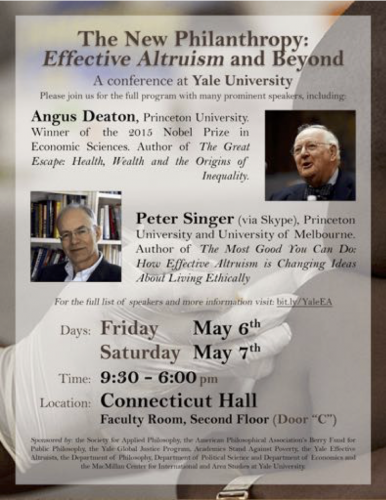
For up-to-date information about the event, including directions to venue, please visit event page.
Over the past several years there has been a groundswell of support for the philanthropic movement known as “effective altruism,” originally inspired by the work of philosopher Peter Singer. Organizations grounded in this approach to alleviating poverty have proliferated – among them GiveWell, Giving What We Can, 80,000 Hours and the Center for Effective Altruism. Broadly speaking, effective altruism is “a philosophy and social movement which applies evidence and reason to working out the most effective ways to improve the world.” Those individuals and organizations committed to it are especially concerned with saving and bettering the lives of the very poor around the world, in line with Singer’s recommendations in his 1972 article “Famine Affluence and Morality.” Certainly, the effective altruism movement is an exceptional example of how social change can be motivated by work in applied philosophy. The robust public and nonprofit support for this approach is surely positive in the sense that many individuals are now convinced not only that they should give to those less well-off than themselves, but also that they should be concerned about how efficiently their money is being used to achieve this goal. This movement has motivated many people to give and so has raised large sums of money for projects that benefit the global poor. Indeed, effective altruism has emerged as the new model of how to lead an ethical life as a well-off individual.
Nevertheless, many elements of the movement have yet to be subjected to proper critical scrutiny, including: 1. how it can avoid bias in favor of interventions that are easy to measure, 2. how to characterize those improvements for which it is difficult to isolate a single causal factor, 3. how non-consequentialist values such as the values of solidarity, political participation and the priority concern for harm avoidance can be integrated into such an account, and 4. the appropriateness of using tools for measurement such as Quality-Adjusted-Life-Years and Disability-Adjusted-Life-Years – which were developed for a very different purpose – in the context of international development and humanitarian projects. In addition, there is also the larger question of whether supporting private, individual interventions or “lifestyle choices” as a solution to a global poverty is justifiable in light of the clear need for lasting institutional economic reforms designed to achieve this goal. The central purpose of the conference is to subject both the theoretical and practical aspects of the movement to economic, political and philosophical assessment, and thereby (hopefully) to enrich elements of its theory and concrete execution.
To that end, the conference will bring together academics (from economics, political science and philosophy) as well as representatives of funding bodies, policymakers and NGO practitioners. The conference will be genuinely interdisciplinary and will include multiple perspectives from each constituency. The time is ripe for an in-depth assessment of this transformation of philanthropic endeavors and its potential to radically change the lives of many of the global poor in the coming years.
The keynote speaker will be Professor Angus Deaton, Dwight D. Eisenhower Professor of Economics and International Affairs at the Woodrow Wilson School of Public and International Affairs and the Economics Department at Princeton University. His research focuses on the determinants of health in rich and poor countries, as well as on the measurement of poverty in India and around the world. He has recently written on the topic of effective altruism and its relationship to poverty alleviation in the Boston Review. He was awarded the 2015 Nobel Memorial Prize in Economic Sciences for his analysis of consumption, poverty, and welfare.
In addition, Professor Peter Singer, Ira W. DeCamp Professor of Bioethics at Princeton University, and a Laureate Professor at the Centre for Applied Philosophy and Public Ethics at the University of Melbourne, will join us from Australia via Skype.
The conference will take place at 9:30am-6pm on Friday May 6 and Saturday May 7, 2016 in the Faculty Room, Second Floor, Connecticut Hall, Yale University.
The conference is sponsored by: the Society for Applied Philosophy, the American Philosophical Association’s Berry Fund for Public Philosophy, the Yale Global Justice Program, Academics Stand Against Poverty, the Yale Effective Altruists, the Department of Philosophy, Department of Political Science and Department of Economics and the MacMillan Center for International and Area Studies at Yale University.
For more information, please contact: newphilanthropyatyale@gmail.
